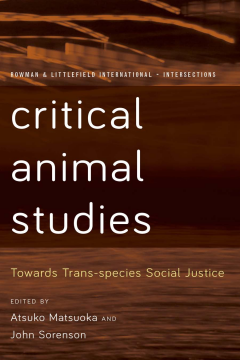
Additional Information
Book Details
Abstract
This important book charts new territory by showcasing some of the newest developments in the rapidly-growing field of Critical Animal Studies. Critical Animal Studies presents a radical ethical and normative challenge to existing systems of power in the context of neoliberal capitalism and to the existential structure of speciesism. The essays in this book link activist and academic approaches to dismantle the exploitation and oppression of nonhuman animals. Featuring an international team of contributors, the book reflects the transdisciplinary character of Critical Animal Studies, with chapters by activists and academics from disciplines across the social sciences, including historical archaeology, political science, psychology, geography, law, social work and philosophy. The book provides advanced-level students with an ideal introduction to a wide range of perspectives on Critical Animal Studies, amongst other things proposing new ways of considering animal advocacy, decolonization and liberation.
This stimulating collection, assembled by renowned scholars, exemplifies the full breadth and maturity of Critical Animal Studies. With authors representing disciplines ranging from archaeology to psychology and employing theoretical frameworks as diverse as analytic philosophy and critical indigenous studies, Critical Animal Studies persuasively demonstrates that questions concerning animals are among the most significant and transformative questions of our age.
Matthew Calarco, Professor of Philosophy, California State University
This anthology contains evocative and smart essays by talented authors that further our understanding of trans-species social justice. I learned from them all, was stimulated and surprised by a few of the turns the essays took, and argued with a few. All in all a good sign of a robust anthology that contributes to a vital scholarly and activist issue—the status of nonhumans.
Carol J Adams, author of The Sexual Politics of Meat
New Directions in Critical Animal Studies is a comprehensive and wide-ranging transdisciplinary volume that will surely set the standard for years to come. Essays by scholars and activists capture the essence of this ever-growing field. This forward-looking book would be an excellent choice for undergraduate and graduate classes, as well as established academics, who would benefit from learning how to improve human-animal relationships in an increasingly human-dominated world.
Marc Bekoff, author of The Animals' Agenda: Freedom, Compassion, and Coexistence in the Human Age and Canine Confidential: Why Dogs Do What They Do
Atsuko Matsuoka is a professor in the School of Social Work at York University. Her publications include Ghosts and Shadows (co-authored with John Sorenson, 2001).
John Sorenson is Professor of Sociology at Brock University.His many publications include About Canada: Animal Rights (2010), Ape (2009), Ghosts and Shadows (co-authored with Atsuko Matsuoka, 2001) and Imagining Ethiopia (1993).
In this powerful, pioneering volume, Matsuoka and Sorenson astutely assess the state of Critical Animal Studies and assemble a diverse and interdisciplinary group of scholar/activists who illuminate the path forward toward justice for all humans and other animals. This indispensable work expands critical thinking while charting the activism needed to challenge the systems of power and domination that underlie the intersectional forms of oppression.
David Nibert, Professor of Sociology, Wittenberg University
Table of Contents
| Section Title | Page | Action | Price |
|---|---|---|---|
| Critical Animal Studies | Cover | ||
| Contents | vii | ||
| Acknowledgments | ix | ||
| Introduction | 1 | ||
| Part I: Activism | 19 | ||
| 1 Animal Agency, Resistance, and Escape | 21 | ||
| 2 Face Us and Bear Witness! “Come Closer, as Close as You Can . . . and Try to Help!”: Tolstoy, Bearing Witness, and the Save Movement | 45 | ||
| Part II: Representing Animals | 71 | ||
| 3 The Disengagement of Journalistic Discourse about Nonhuman Animals: An Analysis | 73 | ||
| 4 Advertising Oppression: The Reproduction of Anthroparchy in UK Children’s and “Family” Television | 94 | ||
| Part III: New Disciplinary Advances | 115 | ||
| 5 Animal Emancipation and Historical Archaeology: A Pairing Long Overdue | 117 | ||
| 6 Political Science and the Animal Question | 143 | ||
| 7 For Spatial Emancipation in Critical Animal Studies | 160 | ||
| 8 Psychological Implications of Undervaluing Animals: Dominance-Based Ideologies and Systems of Oppression | 184 | ||
| Part IV: Animals and the Law | 207 | ||
| 9 Humanizing the Nonhuman: A Legitimate Way for Animals to Escape Juridical Property Status? | 209 | ||
| 10 Posthumanist Animal Studies and Zoopolitical Law | 234 | ||
| Part V: Philosophical Arguments | 255 | ||
| 11 Animal Ethics, the New Materialism, and the Question of Subjectivity | 257 | ||
| 12 A Critique of the Case against Empathy in Animal Ethics | 275 | ||
| 13 The Radical Potential of Analytic Animal Liberation Philosophy | 296 | ||
| Part VI: Indigeneity and Animal Rights | 317 | ||
| 14 The Roots of My Indigenous Veganism | 319 | ||
| 15 Indigenous Worldviews and Critical Animal Studies: Decolonization and Revealing Truncated Narratives of Dominance | 333 | ||
| Index | 351 | ||
| About the Contributors | 359 |
